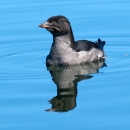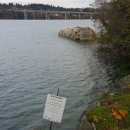States
WashingtonThe use, disposal, and accidental releases of contaminants can have unintended consequences for fish, wildlife, and their habitats. Fish and wildlife serve as indicators of our environment’s health and, ultimately, our own. Protecting fish and wildlife from pollution is an important part of our efforts to conserve the natural resources of Washington state.
Contaminants specialists and ecologists in our Washington offices work on spill response, technical assistance & investigations, and natural resource damage assessments & restoration (NRDAR).
If contaminants spill into the environment, the contaminant specialists along with other federal, state, and Tribal partners, act as “trustees” for natural resources. Partnership is possible because of the federal Natural Resource Damage Assessment regulations.
The ultimate goal of NRDAR is to restore fish and wildlife habitats to the condition they would have been had it not been for the contaminant release into the environment. Check out a story map introduction to our work.
Active NRDAR Cases in Washington We're Involved In:
Recent NRDAR Stories:
2024
- Settlement Finalized to Benefit Salmon, Wildlife, and Local Communities in the Lower Duwamish River, Washington (General Recycling and affiliates) (7/26/24)
- Trustee Agencies Seek Input on Draft Damage Assessment and Restoration Plan for the 1999 Mystery Oil Spill (7/11/24)
- Proposed settlement reached to restore habitats in Port Gamble Bay (6/20/24)
2023
- Proposed Settlement to Benefit Salmon, Wildlife, and Local Communities in the Lower Duwamish River (General Recycling and affiliates) (3/12/23)
- Proposed Settlement to Benefit Fish and Wildlife on the Lower Duwamish River Released for Public Comment (Crowley Marine Services, Inc.) (3/7/23)
- Southwest Yard Habitat Project Complete: Fish and Wildlife Habitat Restored in a Highly Industrialized Area in Seattle (7/18/23)
- Trustees Sign Agreement to Cooperate on NRDAR Activities at Former Gas Plant Near Bremerton, Washington (6/1/23)
Lynden, Inc. Consent Decree and Proposed Settlement Released for Public Comment (1/30/23)
2022
- Pierce County Completes Salmon Habitat Restoration in Clear Creek (11/3/22)
- Service Partners Celebrate the Restoration of Key Fish Habitat Near Everett, WA (9/2/22)
- $1.1 Million Proposed for Salmon Habitat Restoration in Clear Creek, Commencement Bay, Washington (4/13/22)
More Story Maps:
- Where We Work in Washington State
- How the USFWS Environmental Contaminants Program Helps Protect All Living Things.
- Coho Urban Runoff Mortality Syndrome in Puget Sound
- Commencement Bay: Reinvigorating a Critical Urban Estuary
The Lower Duwamish River: Restoring Habitat for Injured Resources in an Urban River
View a library of scientific studies and reports related to NRDAR in Washington




